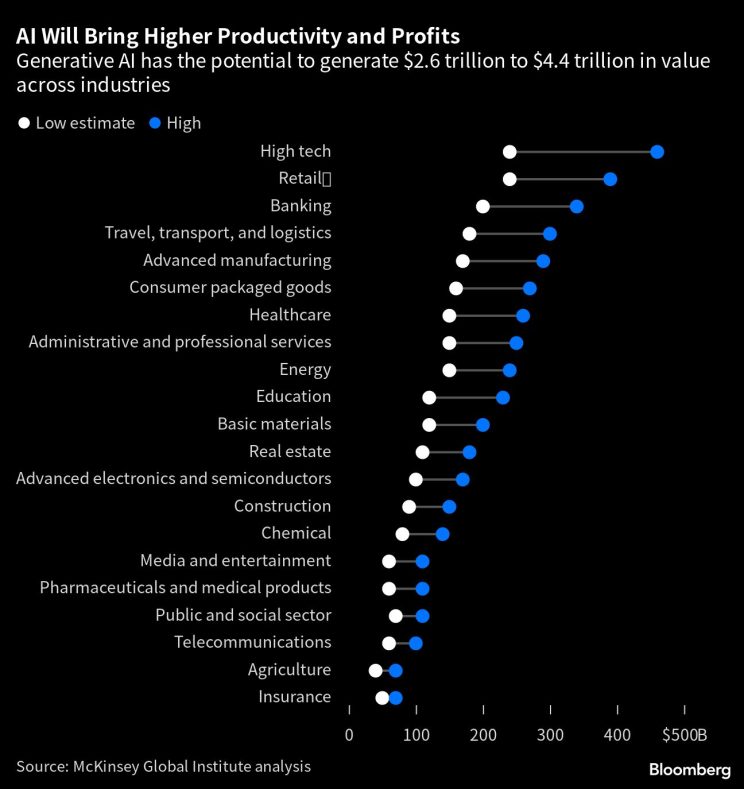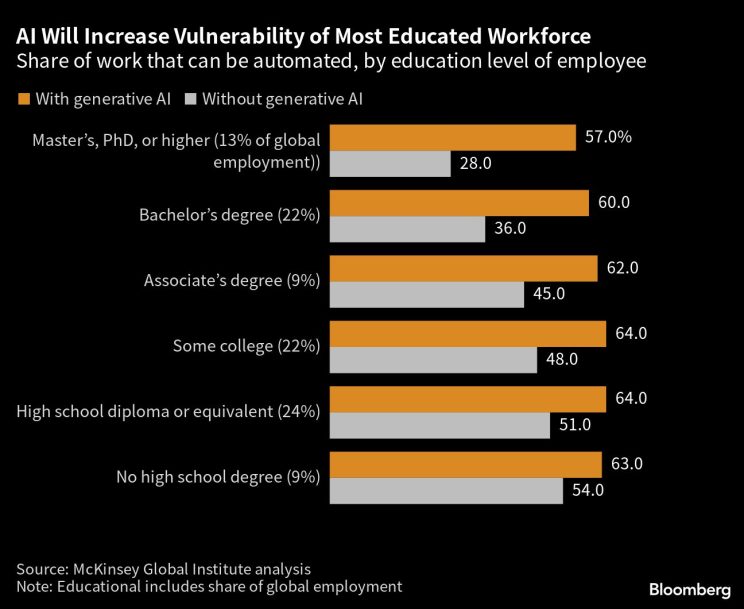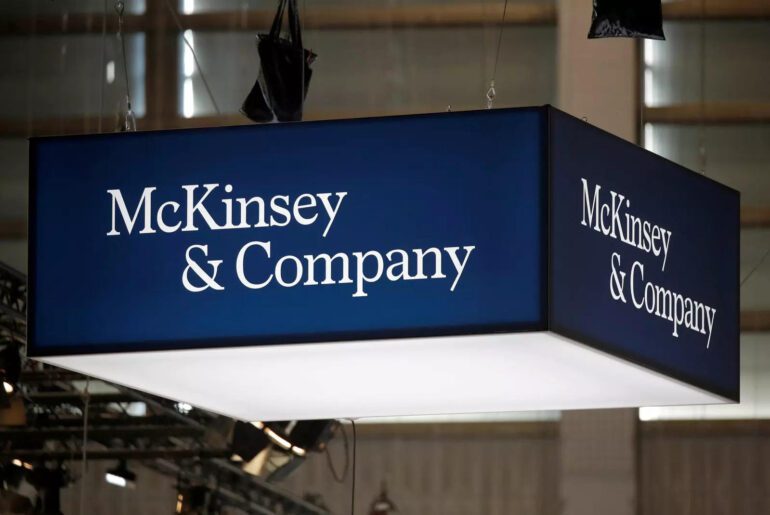TL;DR:
- McKinsey’s report reveals that the AI boom will bring accelerated productivity and economic benefits of up to $4.4 trillion.
- Generative AI will transform various business activities, from sales to customer operations, through increased software integration.
- Productivity gains from AI adoption range from 0.1% to 0.6% over the next two decades.
- Business leaders must strategically navigate the transformation and rethink activities that can be changed.
- Knowledge workers will face significant disruptions, with up to 60-70% of tasks being automatable.
- Applied generative AI will have the most impact on customer operations, marketing and sales, software engineering, and R&D.
- Banking and R&D sectors can expect significant productivity boosts and increased profits through AI implementation.
- AI technology is advancing faster than anticipated, with potential human-level performance in natural-language understanding this year.
- Automation adoption will be faster in developed economies, affecting white-collar work more than physical tasks.
- Workforce composition will be reorganized, with a shift towards more junior-level positions and a decline in middle-management and senior roles.
Main AI News:
In the wake of the global surge in generative artificial intelligence (AI), we are poised to witness a period of heightened productivity and increased prosperity for some, while others, particularly knowledge workers, are set to face profound disruptions. This is the central finding of a new report by McKinsey & Co., a renowned consultancy firm.
The study conducted by McKinsey’s research arm reveals that vast sectors of business operations, spanning sales, marketing, and customer service, are on the cusp of being further integrated with the software. The potential economic gains from this development are staggering, estimated to reach as much as $4.4 trillion, equivalent to 4.4% of the world economy’s total output.
Lareina Yee, a senior partner at McKinsey and chair of McKinsey Technology, asserts that generative AI will equip humans with a new “superpower” while injecting much-needed productivity into the global economy. In their research, McKinsey examined 63 use cases for generative AI across approximately 850 occupations. The report indicates that depending on the rate of adoption and implementation of this technology, productivity could surge between 0.1% and 0.6% over the next two decades.

Yee emphasizes that business leaders must grasp the activities that can be transformed and contemplate how to approach these changes strategically. The ability to navigate this terrain effectively is both a matter of leadership choice and execution.
The transformation brought about by generative AI will exert considerable pressure on the workforce, particularly impacting knowledge workers who traditionally enjoyed relative immunity from automation. The report suggests that a few years ago, approximately half of all worker hours worldwide were spent on tasks that were susceptible to automation. McKinsey now revises that estimate upward to potentially 60-70%. Consequently, employees may find their time reallocated or, in some cases, their jobs rendered obsolete. “Workers will need support in learning new skills,” states the report, adding that “some will change occupations.”
The potential value derived from applied generative AI is projected to be highest in four key business functions: customer operations, marketing and sales, software engineering, and research and development. Within the banking sector alone, the report predicts an additional $200-$340 billion in productivity gains. This will stem from improved customer satisfaction, enhanced decision-making capabilities, and fraud mitigation through more effective monitoring. Such improvements could result in an operating profit surge ranging from 9% to 15%.
Regarding product research and development, McKinsey anticipates a productivity boost of 10% to 15% attributable to generative AI. Notably, the life sciences and chemical industries are cited as examples, where AI can expedite the generation of potential molecules, accelerating the drug and material development process. For pharmaceutical companies and medical product firms, this could translate into a remarkable 25% increase in profits.
The pace of AI advancement is rapid, far surpassing initial predictions. McKinsey previously projected that AI technology would match the performance of an average human in tasks involving “natural-language understanding” by 2027. However, they now assert that this milestone will likely be achieved as early as this year.
The adoption of automation is expected to transpire more swiftly in developed economies, where higher wages make it financially viable sooner than in poorer nations. Moreover, the impact will be felt more significantly in white-collar professions than in physical labor. This stands in contrast to previous technological advancements that often displaced workers in lower-skilled, lower-paid occupations. An infamous example is the Luddite movement, where British textile workers destroyed newly introduced weaving machines to safeguard their jobs. In contrast, the forthcoming paradigm shift is expected to challenge the significance of obtaining multiyear degree credentials, according to McKinsey.
McKinsey’s projections regarding workforce composition align with the findings of a recent working paper published by the National Bureau of Economic Research. The paper, authored by academics from Columbia Business School, the University of Maryland, the University of California at Berkeley, and AI for Good, predicts a substantial reorganization of labor. It highlights that AI investments tend to flatten a firm’s hierarchical structure, resulting in a notable increase in the proportion of junior-level employees and a decline in middle-management and senior roles.




Conclusion:
The AI boom, specifically generative AI, is set to bring forth a wave of accelerated productivity and economic benefits. However, knowledge workers will face significant disruptions, necessitating a strategic approach to navigate this transformation. Sectors such as customer operations, marketing, sales, software engineering, and R&D will experience the most impact. Companies in the banking and R&D sectors can expect substantial productivity gains and increased profits.
The pace of AI advancement is surpassing expectations, with human-level performance projected for this year. Developed economies will witness faster automation adoption, particularly impacting white-collar jobs. Workforce composition will undergo a significant reorganization, with a shift towards junior-level positions and a decrease in middle-management and senior roles. Businesses must prepare for these changes and adapt their strategies to thrive in the AI-driven market landscape.

